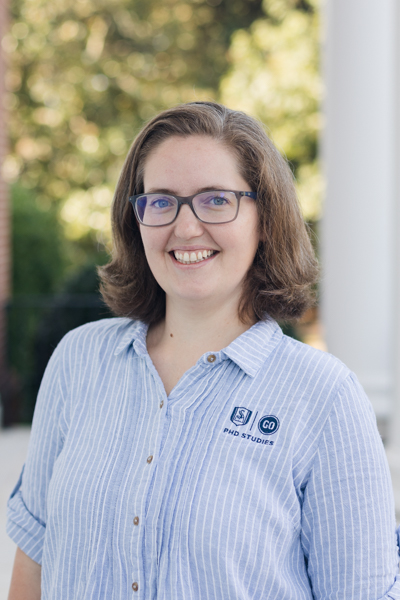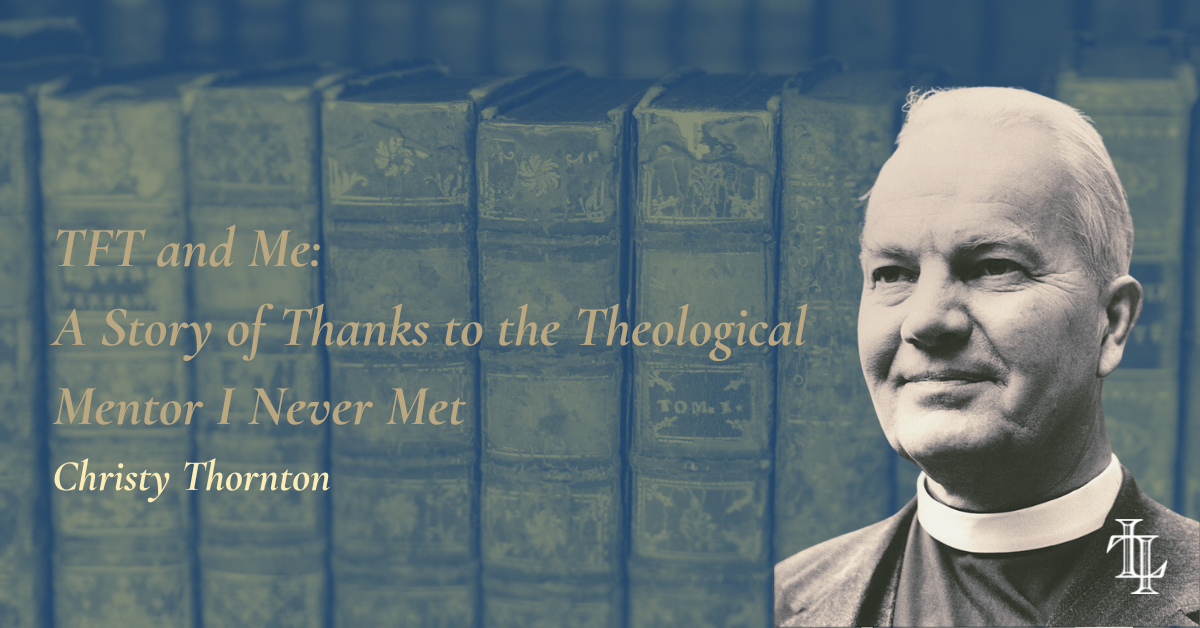I first came across the writings of Thomas Forsyth Torrance (1913-2007) while taking a PhD seminar at Southeastern Baptist Theological Seminary in the Fall of 2017. Like most second year students in American PhD programs, I was on the hunt for that ever elusive and seemingly impossible scholarly contribution to argue as a thesis for my dissertation.
At the same time, I was wrestling with my own angst about doing the PhD at all. I had spent most of my adult life either serving on the mission field or preparing to do so. My journey toward theological scholarship was both unexpected and arduous. I felt deep, personal tension about the bifurcation of the academic work and the real Christian life.
More than I needed a dissertation topic, I needed someone to help me understand how the pieces fit together. If theology was essentially this academic endeavor that occurred in the classroom—why does everything in the Bible seem to center around the church? If theology is just this thing we do with our minds—why is mission so very important in the Bible? How do theology, church, and mission fit together? Because if they don’t, I’m not sure I’m interested in doing this theology thing anyway.
That’s when I read Incarnation, Torrance’s posthumously published notes from his theology class. I was struck by the sincerity of the writing. Torrance writes with density, and wading through his works is not for the faint of heart or mind. At the same time, there were these moments where the dense forest of his prose opens up into this beautiful doxology and wonder at what God has done in Christ. That combination of academic rigor infused with love and worship of God appealed to me. Moreover, peppered throughout the text are encouragements toward mission and evangelism.
In that first read through Incarnation I saw in Torrance a model, at least in part, for who I wanted to be as a theologian.
As I dug into his biography, my fascination only increased. I remember reading about how he grew up as a missionary kid in China to parents who served with China Inland Mission. At which point I was like, “Who is this guy???” I knew all about CIM from my missionary days and its roots from the pioneering work of Hudson Taylor. And this theologian grew up with them? (Of course, like a good Southern Baptist, I immediately did the math to see if his family ever overlapped with Lottie Moon while she was there.)1His father was in China during the last 15 years of Lottie Moon’s ministry. However, they served in different areas of the country. Lottie Moon died the year before Thomas F. was born. So they never met. I like to imagine at some point in his father’s ministry he and Lottie crossed paths, you know as English-speaking ex-pats and all. It’s unlikely, but I still like the thought of it.
From there I learned about his ministry as a Chaplain in WWII, and work as the Moderator of the Church of Scotland (this was the first time he realized he had to have met Queen Elizabeth II, which was way cool to me too). I discovered he did his PhD under Karl Barth and how he turned down a position at Princeton to return to Scotland to prepare for the looming World War. I saw how many of his early writings provided theological mooring to the ecumenical movement to bring unity across Christian denominations.
More than his academic credentials, I was impressed by his ministry experience. He wasn’t the kind of theologian that just wrote books. As far as I could tell from his biography, he invested his life in his community, and encouraged them for mission.
Now, eventually I learned that in real life, he was perhaps a bit brash and intense in the way he went about these various endeavors. I was clueless, but as it turns out, basically anyone in theological institutions in the UK knows and has an opinion about Torrance’s ministry—and I’ve heard plenty of those opinions and stories over the years. Even so, just from my starting point with his biography it was clear that he prioritized real life ministry alongside his more academic writing.
The deeper I got, the more I saw a model for how to be really really smart, and still love God, serve his church, and participate in his mission. If I was going to be a theologian, it had to be that kind or bust.
From then, I was sold. I wasn’t sure where my scholarly contribution would be, but I wanted to tutor under Torrance to learn how to put the theological pieces together, and that’s what I did.
It’s been some six years since I first encountered Torrance. I spent nearly three years intensely working in his collection of works, thinking with him, and developing in my own thinking under his tutelage.2Of course, this isn’t to diminish the real-life impact the other tutors in my life had on my development as a theologian, especially Keith Whitfield and Steve McKinion. But this isn’t a letter of appreciation for them, now is it? 😊 They’ll get theirs in due time, I’m sure.
Having steeped myself in his writing, if I had to boil down the way he continues to shape my theology I’d say 1) Jesus Christ is the centerpiece of the Christian faith. 2) Being (ontology) matters 3) Theology is ecclesial
First, Jesus Christ is the centerpiece of the Christian faith. There is nothing in the Christian faith apart from him. It’s not an overstatement to say that Torrance’s hundreds of works over some five decades is simply an extended explanation of the significance of the hypostatic union. At every turn, and in every direction, Torrance is constantly rehearsing the reality that the “Word became flesh and dwelt among us” (John 1:14). I learned from Torrance that Christians should be unyieldingly Christological, and I love the Lord Jesus Christ all the more for it.
Second, being or ontology matters. In many ways, saying that Torrance taught me that “being matters” is the explanation of how Jesus Christ is the centerpiece of the Christian. Beginning with Christ with a focus on being (ontology) Torrance created an obsessively Trinitarian and Christological project. When Torrance rehearses the gospel, he is always expositing the very being of Christ, who is the incarnate Son of the Father, and powerful presence of the Holy Spirit.3We might say, as opposed to the federalism that he hated, oh so much. The atonement is accomplished in Christ himself by the Spirit. Our knowledge of God is in Christ himself by the Spirit. The very being of the church is in Christ himself by the Spirit. I learned from Torrance, not only the nuts and bolts of these two doctrines, but the essential and inseparable integration of the two in the whole of Christian theology and the Christian life. I, truthfully, don’t even remember how to think about the Christian faith in a different way anymore.
Finally, theology is ecclesial. Like I mentioned before, I started my PhD feeling the tension from what I perceived as a bifurcation of theology and church ministry. Torrance taught me I didn’t have to, and in fact, I shouldn’t. Actually, this topic ended up being the focus of my dissertation where I exposed the overlap in Torrance’s thought between his ecclesiology and his theological epistemology. I’ll spare you the detailed analysis, but the big take-away is that our knowledge of God must occur in the Body of Christ. The church, not the academy or the world at large, is the place where we grow in knowledge of God to Christian maturity, and the most theological activity the church does is the ministry of Word and Sacrament. That’s not to say that academic work has no value. It would be disingenuous for either Torrance or me to make that claim. But the real theological work is church work.
These days, my academic work focuses less on Torrance’s work, and more on developing dogmatic theology within my own Baptist tradition. Even so, I don’t think I could leave Torrance behind, if I wanted to. His theology continues to frame my thinking somewhat intuitively, and I find myself appropriating some significant components of his theological project in my own Baptist work This is a great strength Torrance’s project. Because he’s focused his work on Christ, many Christians from different traditions and denominations can find a theological comrade in him—even a born and bred Southern Baptist like me.
As I look back on the influence of Torrance’s work on my life and scholarship, I can’t help but recall a moment in my oral defense. As we were still warming up, one of my committee members asked me how I felt like I had grown through the process of writing the dissertation. Somewhat unexpectedly, welling up from deep within, I said, “I love Jesus more for having written this dissertation.” Having read Torrance’s work for years, it was like every day he pointed me back to Christ, and uncovered another, more beautiful, facet of who he is and who we are in him. I think of all lasting influence Torrance has had on me, I treasure this one the most.
I will always be grateful Thomas F. Torrance, who showed me that the gospel was more beautiful than I knew, and helped me to love Jesus more than I did before.
[1] His father was in China during the last 15 years of Lottie Moon’s ministry. However, they served in different areas of the country. Lottie Moon died the year before Thomas F. was born. So they never met. I like to imagine at some point in his father’s ministry he and Lottie crossed paths, you know as English-speaking ex-pats and all. It’s unlikely, but I still like the thought of it.
[2] Of course, this isn’t to diminish the real-life impact the other tutors in my life had on my development as a theologian, especially Keith Whitfield and Steve McKinion. But this isn’t a letter of appreciation for them, now is it? 😊 They’ll get theirs in due time, I’m sure.
[3] We might say, as opposed to the federalism that he hated, oh so much.
Author
-

Christy Thornton serves as the Associate Director of PhD Studies and the Director of the ThM program at Southeastern Baptist Theological Seminary.
View all posts




